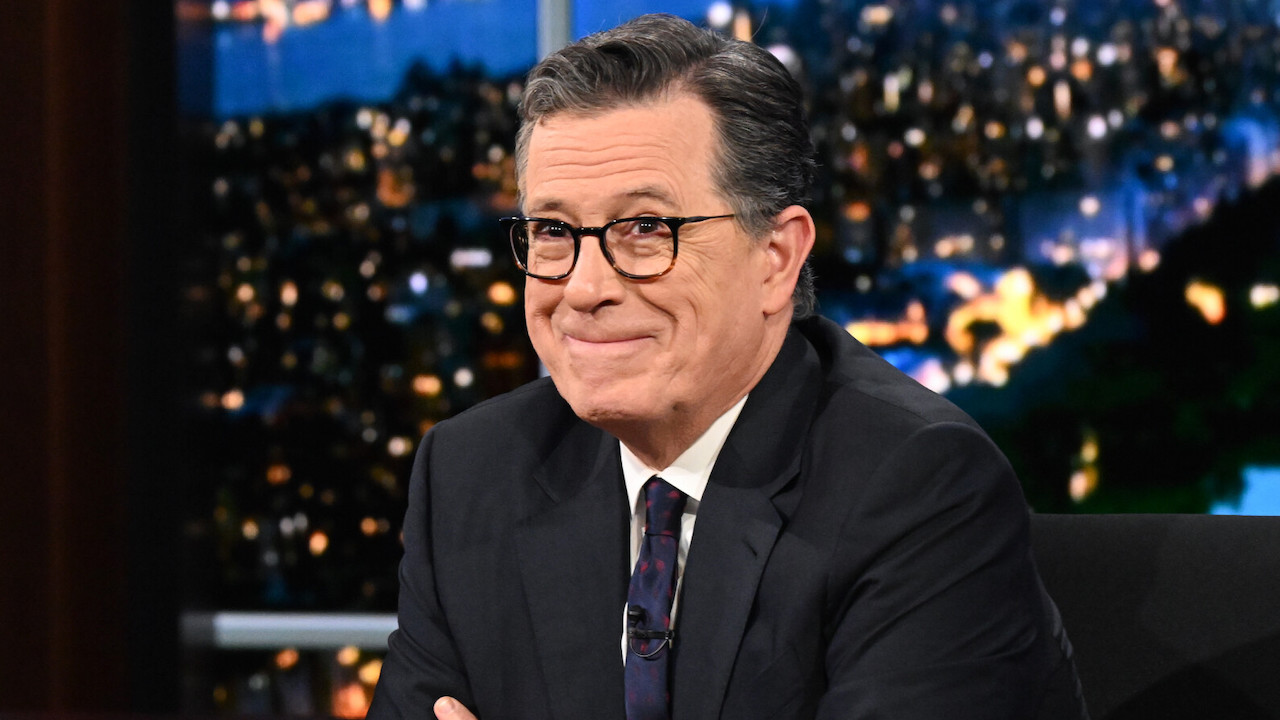Interview: Scott Pilgrim's Brandon Routh And Satya Bhabha
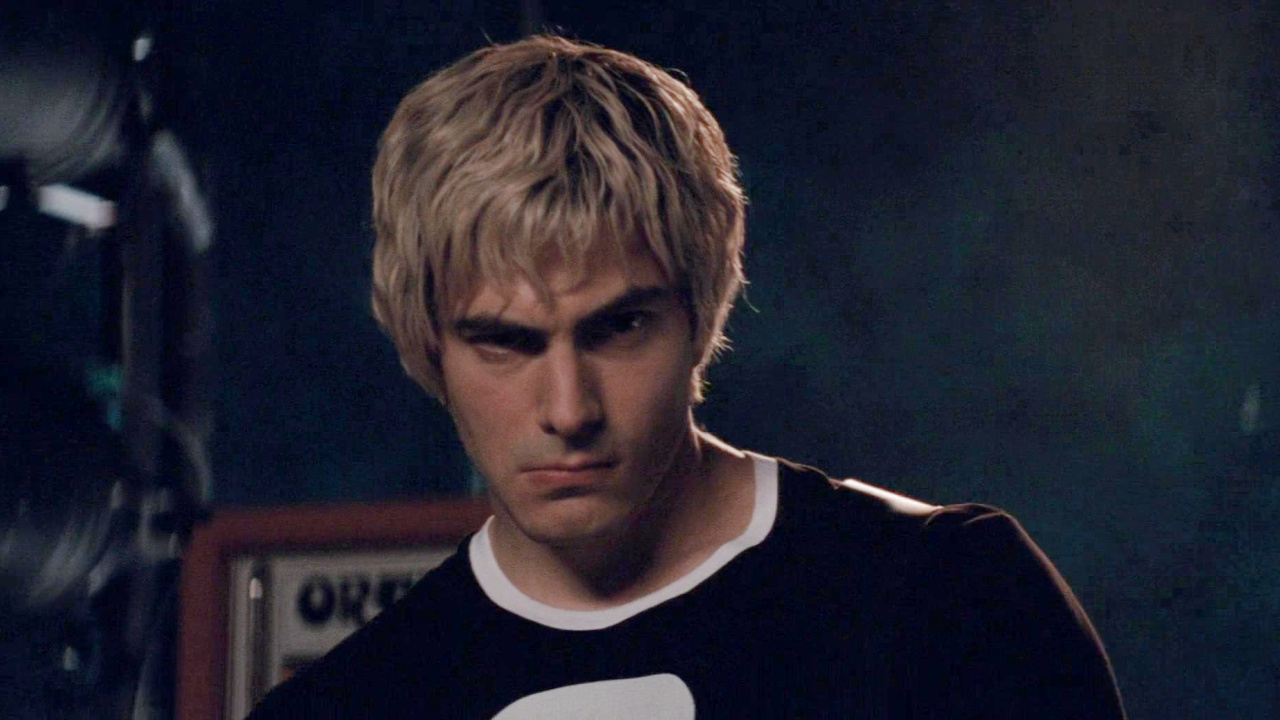
It’s a common view amongst actors that it’s more fun to play the villain. And why wouldn’t it be? The bad guy gets to do whatever they want without the fear of consequence. Being a hero is just work. Even better, the fun level is always increased with the powers of flight and telekinesis, powers which Brandon Routh and Satya Bhabha, respectively, have in Scott Pilgrim vs. The World.
Coming to the film from completely different backgrounds (one played Superman while this is only the other’s third film), the actors discussed what it was like to play two of the seven evil exes, their insane costumes and extracurricular activities while filming in Toronto.
Question: Had either one of you gotten into the comics before this, or knew anything about it at all before this?
Satya Bhabha: No. The first time I heard about it was when I auditioned for the movie. I heard a little bit about it when I was interviewing for the film and auditioning. I got some splash pages and stuff. But then after being cast, I really immersed myself in the world of Scott Pilgrim.
Was everybody happy with their evil ex, or did everybody want to be somebody else’s evil ex?
SB: Oh, I didn’t want to be anything but Matthew Patel. I mean, who else gets to dance and sing?
Brandon Routh: I had dreams of being Roxie Richter, but God had other plans. So you have a telekinesis power now.
Your Daily Blend of Entertainment News
BR: Yes.
That was wild.
BR: Watch your drinks.
Because he’s evidently levitating them under the floor.
BR: I did, yeah, it was a lot of fun to play such a big character, and to play a character… which is something I’ve been looking to do for quite some time, to kind of shake off the Superman image a little bit.
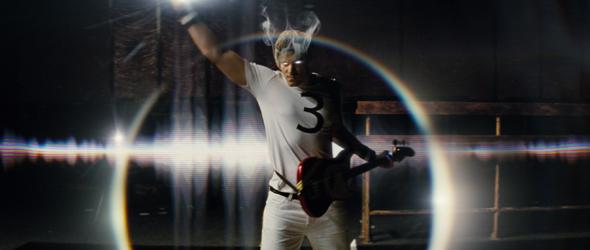
Can you talk about working with Edgar Wright? People have said that he allowed for play, and then that everything was also very strict. What was your experience of working with him?
BR: I can talk about working with Edgar. There was an embargo before, but I think…
SB: At this point, we’re allowed. I think it’s sort of a combination of that. Basically Edgar’s just really… Edgar has a really clear and specific vision, and always did. Between him and Bryan Lee O’Malley’s amazingly detailed comics, a lot was in place, and there were a lot of shots, a lot of images that we really wanted to get exact. But you know, when you have a director who’s so in control and has such a strong vision, it actually frees you up as an actor. To play, to have fun. Because if there’s something that’s needed, we’d know, and we’d get told, “We need to get that shot, we need to get that shape.” But apart from that, I really felt totally free and easy to play and to experiment with stuff, knowing that Edgar would tell me if he wanted it this or that other way. There’s nothing worse than a director who’s like, “I don’t know, just kind of do what you feel, figure it out…”
BR: Wishy-washy
SB: Because then you feel completely unsupported as an actor.
BR: It’s like a tightrope without a net.
SR: Exactly, and it’s also like, “Do what you feel.” I’m an actor man, I don’t feel anything. What do you want me to feel? So getting some sort of guidance from Edgar was great, but I never felt imprisoned by his vision.
BR: Technical aspects were very key. Many times, you’d have to do something again. It’s a big set up, but because of all the effects that are involved, and wanting to match the comic book so well, that’s part of the job. You know that going in, and it’s because of that that the movie looks so polished and works so well. But as far as the acting and the dialogue and all that stuff, and the character, there was more room to explore that. Some more freeing things. So you had the technical aspects of where my hand is, and am I getting the strum of the guitar right, and that kind of stuff, but it was much more free process with dialogue.
So it wasn’t any more weird doing the effects for this than for Superman.
BR: It was much easier, much easier doing this. Learning to play the bass is easier than learning to fly. Although I was strapped to a guitar and in wires a couple of times. Doing that at the same time was strange. But it was for a day, maybe, and not four or five months.
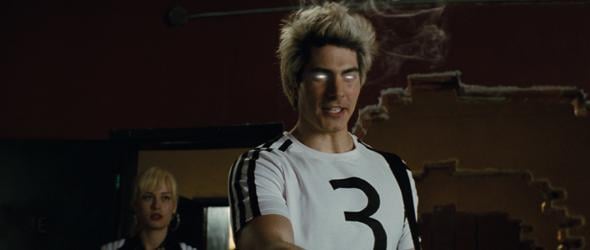
So had you seen the storyboards knowing what was shooting out of your eyes?
BR: Somehow, I missed the eye thing. I guess because I was more focused on the hair going up and the power shooting out of the hands. So when I saw the trailer, I was like, “Whoa, look at that!” It was awesome, because I didn’t have to wear big contact lenses or anything like that.
Is there a need at all to find the humanity in a character like this, or do you just go for the artifice of the project?
BR: There is some humanity in Todd. I was just going to say there’s no humanity because he’s vegan. But yeah, there is. You see at the end, he doesn’t want… before he’s extinguished, you see a flash of that, guilt, because he did betray the vegan way. And there is real passion or hate for Ramona, or jealousy that she left him. That somebody’s better than him. So those are flashes of emotion. He’s not a robot. He’s just not very good at controlling it, his humanity.
Fear of the Vegan Police?
BR: Right.
SB: I think that both Bryan and Edgar--you see in the comics—does a really good job of sort of coloring these villains in many colors. You have the initial image of them as these arch-villains, but then as you learn more about them and we hear a little bit of backstory, everybody’s been really hurt badly by Ramona Flowers. A fickle lady. So that, I think, comes across in every character.
You’re more singing and dancing… your evil is singing and dancing. Was that natural for you because you’re a big sing-and-dance man?
SB: I’m not a big sing-and-dance man.
BR: That’s what we used to call him on set: the Big Song-And-Dance Man!
SB: Yeah, “song-and-dance man back to set!”
BR: It was good! The dancing looks good! Was that all you dancing?
SB: That was all me dancing.
BR: That’s awesome! The little leg thing?
SB: The leg thing stayed in! Thank God!
BR: That’s impressive, the Michael Jackson leg thing.
So did you choreograph yourself?
SB: Well, we worked with a choreographer. Me and her, we sort of figured out the dance moves ourselves. I don’t know too much about Bollywood at all, but I’ve done quite a bit of dancing… and not much singing. But between the stunt choreography and that, there was a lot of choreography there. But I do feel that the majority of the work was in terms of the kung-fu and the hand-to-hand stuff. I mean that was something very alien to me. I had never been in wires before. I couldn’t do Superman, which is why they called Brandon. It was a big learning experience that, a big challenge. It was really exciting. The song-and-dance stuff, though, is definitely one of those what-the-fuck moments, where the movie kind of like takes a left turn and lifts off into Crazy Land. And I think that it works. I think that it’s something that was in the comic books, and that people were really excited about seeing, and it’s sort of come through.
BR: They cut my song-and-dance routine. It’s on the DVD.
Would you have wanted to do one?
BR: I would have done whatever Edgar would have asked me to have done in this movie. It would have been an interesting song and dance. I don’t know if Todd Ingram can dance very well. But neither can I, so it would have been perfect.

You talked about learning to play bass. Did they actually take time to teach you a little bit, or did you have, like, a bass double?
BR: No, that was all me. There was no bass double in sight. They relied on me. I had a couple of teachers who I worked with in about three or four months to learn the one Metric song, “Black Sheep,” and then the three little bass riffs. It took all of that time for me to get it down. The song was easy enough; the bass riffs, the last one was like octaves. I’m not going to sing it to you, but it was very challenging to get my hands to do that, and then not look at my hands while I’m doing it. And then they attached these—they didn’t tell me this until I got to Toronto—there were these light contraptions, like Christmas lights, with a D battery strapped into my armbands that I had to have right here and right here. So not only do I have that, but I have all this gear that I have to work around.
Electrocuted.
BR: But it worked out great, I think. And now I wish there was more hand shots in there because it looked good. I want to see my work!
What did you think of that weird blonde wig, and what did your wife think of that weird blonde wig?
BR: Weird blonde wig? Come on, it’s perfect!
I don’t think you’re a blonde.
BR: Not my best color. Maybe if my eyebrows were blonde, I might pull it off a little bit better.
Anybody see you in the wig and go, “Who is that?”
BR: I hope people watching this movie will go, “Who’s the vegan? Oh, Brandon Routh is in this movie!?”
I wasn’t ready for that wig because I haven’t read the comics.
BR: Yeah, the down look was not my favorite of the two. I definitely like the faux-hawk better. It was a little more stylish. But you know, Michael’s hair is kind of like that. And so I’m basically his alter ego. I’m his über-doppelganger.
That makes sense.
SB: The wigs and the costumes were like a huge part of the character. I also had that crazy wig on.
But that was in the comics. They copied the comics.
SB: Yeah, that was fresh out of the comics. There’s something just so exciting about that. It really helps you get into a character and figure out this persona. I’d turn up bleary-eyed at six in the morning, and two hours later I’d look up and I’d be like, “Oh, I guess Matthew Patel’s in the house!”
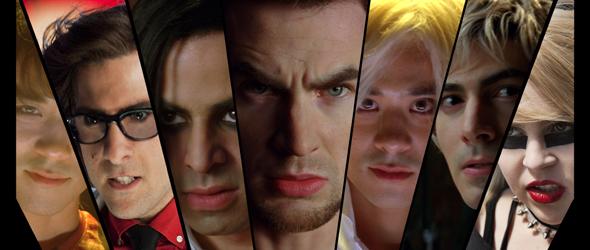
Were you guys involved in any of the off-set activities. I heard there was some karaoke involved, and some eating off set. Did you hang out with everyone else?
BR: I didn’t get any karaoke in. That would have been fun.
SB: I got some karaoke in. I’d forgot about that. We did some karaoke. I think me and Mark Webber did a stunning rendition of the Whisper song. I don’t know if you guys know that rap song. It’s filthy. And then yeah, probably every single restaurant in Toronto at least twice.
In costume? Oh God!
SB: Oh no. Not in costume, please. I got that wig off as soon as I could. And the eyeliner.
BR: And movies. Edgar had like a double feature thing he did at the Bloor Cinema up there, which was fun.
He showed you guys something?
BR: Yeah, he hosted like a double feature night for a couple of nights.
SB: Sundays.
BR: Yeah, Sundays.
What did you see?
BR: They did The Warriors. A double feature of The Warriors and something else. A movie that takes place in the 50s that’s much like The Warriors. But it wasn’t filmed in the 50s.
SB: He did like a Bill Pope double bill, who was our amazing cinematographer.
So you had like several movie nights then?
SB: No, Edgar had like a series at the Bloor Cinema while we were shooting.
BR: That everyone could come to.
SR: Yeah, open to the public. He hosted every Sunday, for about a month or two, double features. I think it started with Hot Fuzz and Shaun of the Dead, but then he also did a Spaced marathon. They did all the episodes of Spaced. So they did a lot.
He just happened to be doing that while he was shooting this movie?
SB: I think he was up there, and they had got in touch with him, or he had maybe got in touch with them.
BR: He’d done it in other places. I think when he shot in London, he’s done that kind of stuff. A celebration of movies and stuff.
Any word on Dead of Night?
BR: Well, the title’s been changed to Dylan Dog now. I think that’s official, dare I say, as everyone writes that down. I believe that yes, we have changed to Dylan Dog or will. I don’t know exactly what’s happening. The film is done. It’s a fun ride for sure, and we’re supposed to be hearing something in the next few months about a domestic release. I think the international release is pretty much set up. They’ve got distribution for that, and they’re just figuring out the right business scheme to put it out domestically.

Eric Eisenberg is the Assistant Managing Editor at CinemaBlend. After graduating Boston University and earning a bachelor’s degree in journalism, he took a part-time job as a staff writer for CinemaBlend, and after six months was offered the opportunity to move to Los Angeles and take on a newly created West Coast Editor position. Over a decade later, he's continuing to advance his interests and expertise. In addition to conducting filmmaker interviews and contributing to the news and feature content of the site, Eric also oversees the Movie Reviews section, writes the the weekend box office report (published Sundays), and is the site's resident Stephen King expert. He has two King-related columns.
